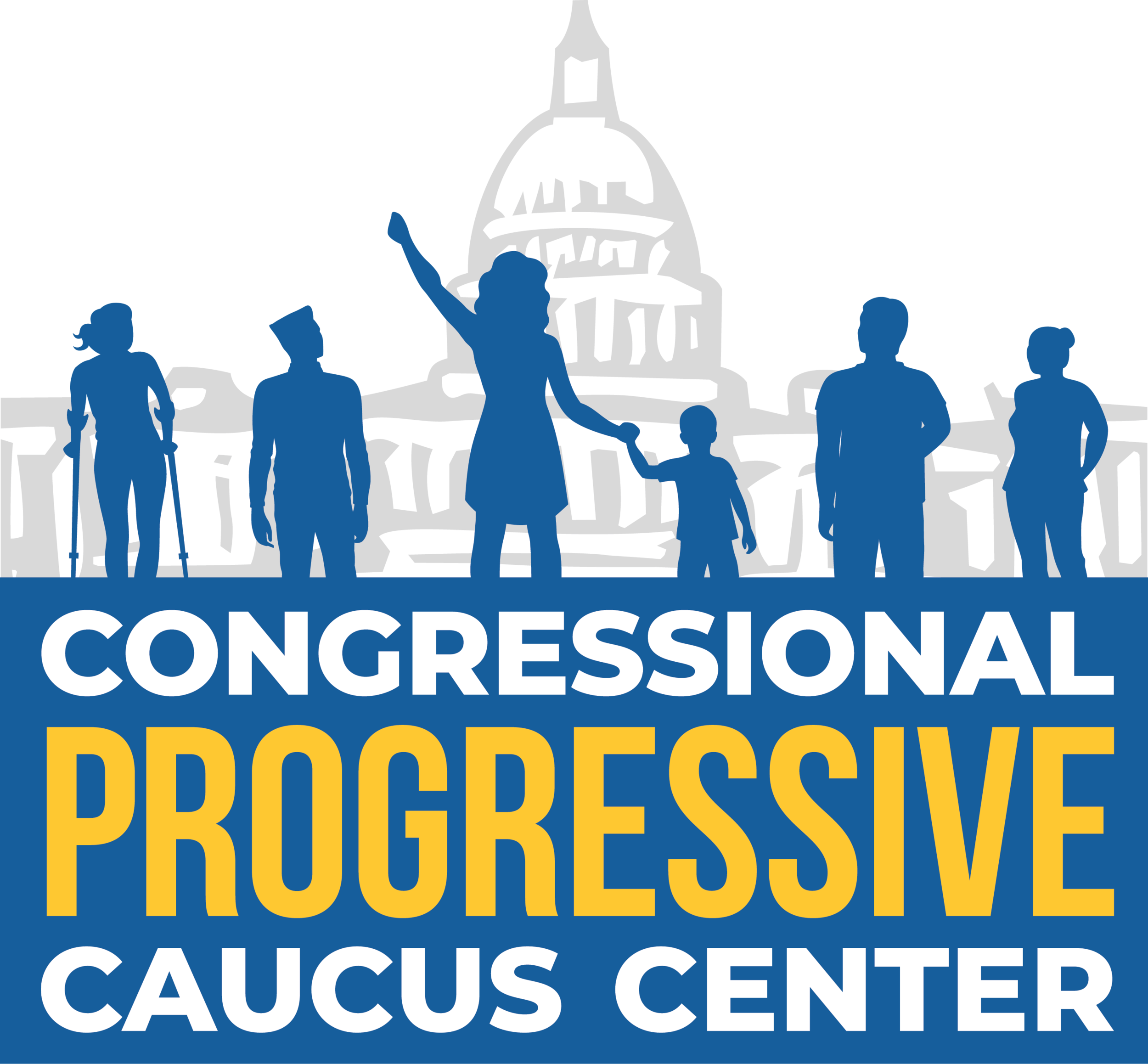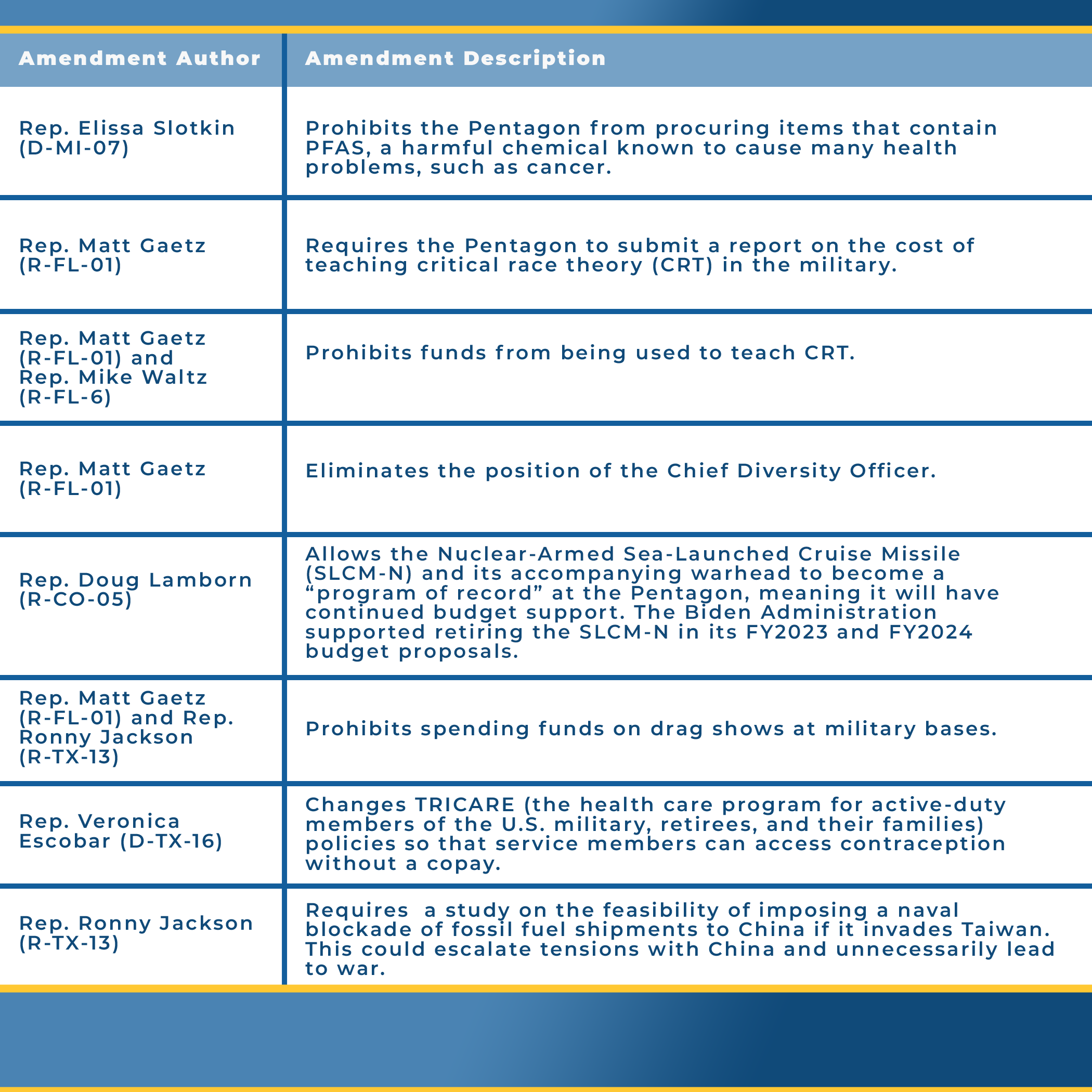Comparison of the House and Senate FY2024 National Defense Authorization Acts: A Primer
Last updated August 9, 2023
Author: Mariam Malik, Foreign Policy Associate (mariam@progressivecaucuscenter.org)
Introduction
The National Defense Authorization Act (NDAA) is annual legislation that authorizes funding and sets policies for the Department of Defense (DOD), nuclear programs at the Department of Energy (DOE), and other defense activities at other federal agencies. Unlike an appropriations bill, the NDAA does not give the Pentagon any money. The House of Representatives Fiscal Year (FY) 2024 NDAA is the first under new Republican leadership since 2018. The right-wing faction of the Republican Conference, the House Freedom Caucus, heavily influenced the NDAA’s content, using the bill as a vehicle to advance their ideological priorities and domestic agenda.
At the time of this writing, both the House and Senate have completed consideration of each chamber’s NDAA. Conference (explained below), which has yet to be announced at the time of this publication, will reconcile the differences between the two bills. This explainer overviews key developments and policies passed in each chamber’s NDAA.
House Armed Services Committee
On June 21, 2023, the House Armed Services Committee (HASC) marked up H.R. 2670, the House NDAA, which authorizes $886 billion for Pentagon spending, nuclear weapons programs at the Department of Energy, and other defense-related programs. The mark-up considered 800 amendments to the bill and ranged in topics from Pentagon spending; Congressional War Powers; weapons transfers from the Pentagon; attacks on abortion rights, reproductive care, diversity, equity, and inclusion (DEI) efforts, and LGBTQIA+ rights; China; and Ukraine. Some of the amendments and provisions HASC adopted include:
After a more than 12-hour long markup, HASC passed H.R. 2670 by a 58-1 vote. Rep. Ro Khanna (D-CA-17) was the only vote against it.
House Floor Consideration
The House considered over 300 amendments during floor consideration of H.R. 2670 and adopted ones that would restrict abortion access, deny gender-affirming care, and restrict or eliminate DEI efforts in the military. DEI efforts in the military are critical given the military’s history of discrimination and extremist recruitment of veterans. Some of these adopted Floor amendments, as well as amendments on other matters, include:
H.R. 2670 passed on a 219-210 vote–a slim margin for a bill that always received strong bipartisan support, usually over 350 votes in favor. Because of the egregious measures limiting abortion rights, attacking trans rights, and restricting inclusion efforts, many Democrats, who typically vote in favor of the NDAA, voted against it this year. When the final text of the legislation became clear, in particular, the New-Democratic Coalition (which describes itself as “pro-economic growth, pro-innovation, and fiscally responsible policies”) stated it would vote against it; all ranking leadership on HASC— including HASC ranking member Adam Smith (D-WA-09) — stated they would vote against the bill; and Democratic leadership put out a statement that Democrats urge a no-vote.
Senate Armed Services Committee
The Senate Armed Services Committee (SASC) marked up S.2226, the Senate version of the FY2024 NDAA, on June 23, 2023. The SASC markup occurred, as usual, behind closed doors. A few provisions of the SASC bill include:
Authorize $886 billion for Pentagon spending, nuclear weapons programs at the Department of Energy, and other defense-related programs.
Train, advise, and provide institutional capacity-building to Taiwan’s military.
Increase the pay for servicemembers and civilian employees by 5.2 percent.
Support the Pentagon’s funding request for naval vessels, combat aircraft, armored vehicles, weapon systems, and munitions.
Authorize the Navy to procure 10 Virginia-class submarines under multi year contracts.
Reduce the total number of fighter aircraft the Air Force is required to maintain from 1,145 to 1,112, and allow the Air Force to retire 42 A-10 aircraft in FY2024.
Establish and fully fund a Pentagon-National Nuclear Security Administration (NNSA) joint program to further develop the SLCM-N to address China’s nuclear breakout and Russia’s aggression.
Senate Floor Consideration
On July 19, 2023, the Senate began its floor consideration of S. 2226. Senate floor proceedings do not operate under a rule as the House does, but generally via unanimous consent. In the case of S. 2226, there were over 900 amendments offered and 121 adopted. Some of the amendments that were adopted include:
On July 27, 2023, the Senate passed S. 2226 by a 86-11 vote.
Conference
Now that the House and Senate have each passed their own versions of the FY2024 NDAA, the two chambers must reconcile the differences through a conference committee, where members from each chamber - usually those on HASC and SASC - negotiate the differences between the two pieces of legislation. Sometimes a formal conference committee is not announced, and each chamber’s leadership and relevant members, such as those on HASC and SASC, meet informally and behind closed doors to conference the two bills. Once an agreement is reached, the bill is referred to as a conference report. Each chamber then votes on the conference report (a conference report can be debated in either chamber, but cannot be amended), and once it passes, it goes to the President’s desk.
This year the House and Senate NDAA bills are starkly different. The Senate bill does not include harmful measures limiting abortion rights, LGBTQIA+ rights, or attacking DEI efforts, as the House bill does. Conference negotiations will likely address the reality that Democratic opposition to these provisions in the final bill would risk the NDAA–a “must-pass” bill–not passing. Additionally, White House National Security Advisor, Jake Sullivan, stated that the House NDAA is “never getting to the President’s desk,” signaling the Administration’s concern that House Republican leadership turned a bill meant to bolster America’s “defense” into one that advances a domestic right-wing agenda.
Pentagon Topline
Another development that makes this year’s NDAA stand out from past ones is the Pentagon topline. Usually, both the House and Senate pass an NDAA that increases Pentagon spending beyond the President's budget proposal. However, this year, because of the Fiscal Responsibility Act of 2023 or the debt ceiling deal, there was no such effort. The debt ceiling agreement called for $886 billion in defense spending for FY2024, which is what the Biden Administration requested in its FY2024 budget proposal – this is a $28 billion, or 3.3%, increase from FY2023. Neither HASC nor SASC adopted amendments during their markup increasing this topline, as has been done in the past. Both H.R. 2670 and S.2226 included a topline of $886 billion.
Even though there were no amendments to increase Pentagon spending, there were amendments, in both chambers, to reduce it. Rep. Barbara Lee (D-CA-12) and Rep. Mark Pocan (D-WI-02) introduced an amendment that would cut the Pentagon Budget by $100 billion. The Rules Committee did not make this amendment in order, meaning it did not get House floor consideration. Sen. Bernie Sanders (I-VT) introduced an amendment to cut the Pentagon budget by 10%. It received a stand-alone vote on the Senate floor but failed, receiving only 11 votes.
Conclusion
Instead of using their House majority to address the needs of people in the U.S. and around the world, the House Republican Leadership used the NDAA as a vehicle to propel a right-wing domestic agenda that curtails abortion and LGBTQIA+ rights, hinders efforts to advance DEI, and attack what it calls a “woke-agenda.” The House and Senate will now have to conference the NDAA and address policies on domestic social issues in a bill meant for foreign policy and defense.




